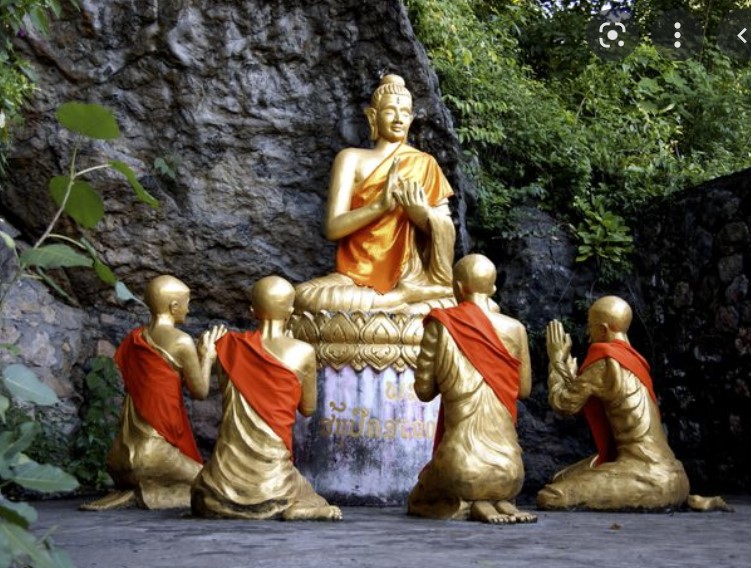
It was the 8th day of the 12th lunar month, the story goes, that Siddhartha Gautama, also known as Shakyamuni, awoke from a week of meditation to view of the morning star - Venus - and exclaimed, "That's it! That's it! That's me! That's me that's shining so brilliantly!" In that single moment he fully realized the Dharma - that body of unalterable, immutable, unending Truth that he would spend the rest of his life teaching to others.
Zen Buddhists of Japanese traditions celebrate Bodhi Day (Rohatsu) on December 8th (even though "Rohatsu" means, literally, "the eighth day of the twelfth _lunar_month"); In China this important event is mostly forgotten in popular culture even though the day is not. The 8th day of the 12th lunar month, Laba Jie (làbajié), is celebrated yearly by billions as a reminder of the upcoming New Year. Knowledge of the Buddhist origins of the Laba festival has become lost to contemporary Chinese culture, just as the Christmas Tree has mostly forgotten origins that predate Christianity.
Many eastern Mahayana Buddhist traditions around the world now celebrate Wesak (in Sanskrit, Vaisakha - Buddha's birthday) to commemorate the Buddha's life and enlightenment on the first full moon of the fourth lunar month. Our Chinese Chan sect celebrates both the Buddha's Day of Enlightenment -- going by the lunar calendar (the 8th day of the 12th lunar month) -- as well as the Buddha's birthday (fatdáahn) on the 8th day of the 4th lunar month. Confusing? Regardless of the day we choose to celebrate Bodhi Day, commemorating the day of the Buddha's enlightenment offers a wonderful opportunity for us to reflect on our own spiritual practices and consider the significance of an event that changed the course of history for humankind some 2500 years ago.
For many sanghas of Japanese Zen traditions, the week leading up to Rohatsu is a week of intense meditation as followers work to become enlightened by re-creating the circumstances surrounding the Buddha's enlightenment experience. However we celebrate the Buddha's Day of Enlightenment, let's remember that, while the Chan tradition teaches us to respect the Buddha's teachings, it also teaches that we cannot expect spiritual growth merely by copying or mimicking the masters. Lin Chi explained it as well as anyone: we "don't seek the masters, we seek what the masters sought." A week or even a single day of meditation will not bring us to self-realization/enlightenment if our purpose is false. Walking in the shadow of another is to remain a slave to darkness. Enlightenment happens only through our own effort focused on our own lives. And it's through deep and honest self-inquiry that we come to realize that life-altering eureka moment as the Buddha did and exclaim, "It's _me_ who shines so brightly!"
Let's approach Bodhi Day by considering whether our regular spiritual practices are enabling us to see our own shining light. If we discover that we don't shine so brightly as to offer competition to the Morning Star, let's re-evaluate our spiritual practices and determine why not. Are we attending to our daily lives with the same fierce concentration and awareness that we apply to our meditation practice? Regardless of where we are on the Path, if we consider ourselves to have reached our maximum dharma brightness we have not only undervalued the Dharma, we have undermined our progress. The light of en-_light_-enment knows no boundaries.
Let's celebrate Bodhi Day not as a ritual or as an effort to "suck sustenance from the dry bones of the masters," but as an opportunity to give thanks and to re-affirm our own spiritual lives. Let's remember that what we're celebrating on this day has brought us vast quantities of beautiful art and literature from thousands of communities and cultures around the world. It has brought us the wisdom of Lin Chi, Hui Neng, Hsu Yun, and so many other great spiritual leaders and inspired countless millions of people to greatness.
And it all began with one man awakening to his True Nature; one man who would not rest content until the ultimate question of his life was answered.
Let's celebrate Bodhi Day by caring for our own spiritual lives, our own spiritual practices, and by caring for the wellbeing of others. Let's muster the force of Will needed to pierce the veil the illusory world has draped over us. Then, with unrelenting determination, let's drop our baggage and let our spirits shine as brightly as the Morning Star. Then we, too, become Buddhas.
Namo Amitofo, Fa Dao
December 7, 2007
